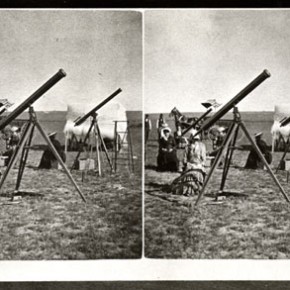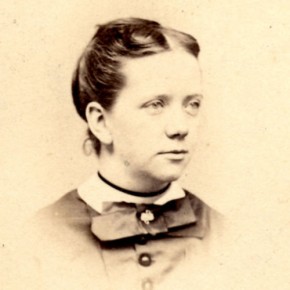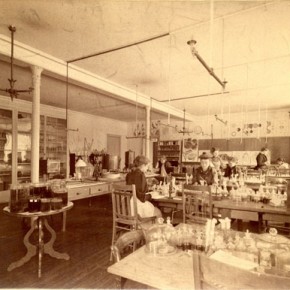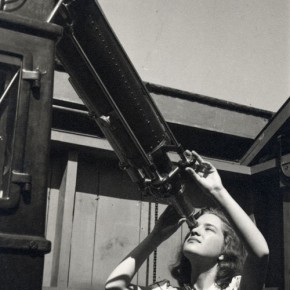On October 15, 2013, we celebrate Ada Lovelace Day, an annual event recognizing achievements of women in science, technology, engineering and math. Ada Lovelace (1815-1852) was an English mathematician and writer, as well as a countess, and is known for her work on mathematician Charles Babbage’s early mechanical general-purpose computer, the Analytical Engine. Her work included what is considered to be the first algorithm meant to be processed by a machine — granting her recognition as the world’s first computer programmer. [1, 2]
It is in this spirit of scientific exploration, critical thinking, and a liberal arts education that we recognize the many women scientists, engineers, technologists, and mathematicians that are part of the Vassar community. (We salute the many men, too, of course — but it is Ada Lovelace Day!) Two of the more notable women whose work can be found at the Libraries include:
Maria Mitchell, faculty member and astronomer
-
See pictures of Mitchell through Vassar’s digital library
-
Explore the Maria Mitchell Papers at the Archives & Special Collections Library
The first person appointed (1865) to the faculty at Vassar — male or female — and first director of the Vassar College Observatory, Mitchell was already famous for her 1847 discovery of comet C/1847 T1, known as “Miss Mitchell’s Comet.” Her scientific work was matched by her dedication to her students, who responded in kind. “[M]y joy over Astronomy is extreme,” wrote student Julia Pease in 1874, describing Mitchell’s difficult class but her commitment to making sure her students fully understood the material. Pease’s letter to her sister noted:
Just let me tell you a little secret. Some weeks ago three of us had become so much discouraged over it [Mitchell’s astronomy class] and thought ourselves too dull, that we had serious intentions of dropping it and taking something else. Miss Braislin [a Vassar mathematics professor] got wind of our little plan and confided it to Prof. Mitchell, who came immediately and took each one separately, encouraging her and urging her to go on. She was so lovely that we could not help keeping on… [3]
Beyond a dedicated faculty member, Mitchell was an ardent suffragist and abolitionist, and an early proponent of equal pay for male and female faculty members. Despite her fame, she learned that she was paid considerably less than her male counterparts at Vassar and demanded a raise — and got it. Mitchell even received her own Google doodle last August!
Christine Ladd-Franklin, mathematician and logician
-
Explore and search through Ladd-Franklin’s diaries online before she arrived at Vassar and while she was here
-
Learn more through the Christine Ladd Franklin Papers at the Archives & Special Collections Library
Christine Ladd-Franklin (VC 1869) was a mathematician, logician, and psychologist. Her talents were considered extraordinary by her professors, though she often expressed self-doubt of her abilities in her diaries. Ladd-Franklin’s interests were varied; for example, on October 15, 1867, she wrote of her studies:
Oct. 15. This has been a most successful day to me. I completed an original demonstration in Physics, which to be sure did not appear before the class but which gained the approbation of my room-mate, Fanny Case. Then in Astronomy I also had the pleasure of working out an original demonstration of the sextant which was “very gratifying” to Miss Mitchell. Again in Greek, I met with most brilliant success (p. 25).
Upon her graduation from Vassar, where she studied with faculty such as Mitchell and noted, “The renown of having been educated at Vassar College has secured for me many pleasures,” (p. 45), Ladd-Franklin applied to Johns Hopkins for her doctorate before the university accepted women. Though she completed the requirements for the doctorate, it was not awarded to her until 44 years later. Her career in logic, in particular, included a breakthrough in the logic problem of the transformation of the syllogism. [4]
Vassar scientists then and now…
Other notable women scientists from Vassar include:
-
Ellen Swallow Richards (VC 1870), early ecologist, considered by many to be the founder of ecology.
-
Grace Hopper (VC 1928), computer scientist, noted for her invention of the compiler.
-
Gladys Hobby (VC 1931), microbiologist and pioneer in penicillin trials for humans.
-
Winifred “Tim” Asprey (VC 1938), instrumental in the creation of Vassar’s Computer Science Center (1963) and the Computer Science Program. Professor Nancy Ide (another incredible Vassar computer scientist, noted for her work in computational linguistics and the Text Encoding Initiative) wrote a wonderful summary of the history of the Program for Vassar’s 150th anniversary.
-
Vera Cooper Rubin (VC 1948), recipient of the National Medal of Science and worldwide honors for her pioneering work on dark matter in the universe.
-
Ellen Kovner Silbergeld (VC 1967), MacArthur Fellow who studied neurological problems caused by lead, and among the first to advocate for lead-free interior house paint.
-
Bernadine Healy (VC 1965), the first woman appointed head of the NIH and creator of the Women’s Health Initiative.
-
Debra Elmegreen (current VC professor), Professor of Astronomy on the Maria Mitchell Chair and former President of the American Astronomical Society.
Although we couldn’t possibly list all the Vassar women who have done significant work in the sciences, we hope the stories of these extraordinary women and their intersection with Vassar encourage you to explore more about the sciences at Vassar, the information we have at the Libraries, and of course, Ada Lovelace herself. Happy Ada Lovelace Day!
Notes:
[1] http://www.findingada.com/who-was-ada
[2] http://en.wikipedia.org/wiki/Ada_Lovelace
[3] http://digitallibrary.vassar.edu/fedora/repository/vassar%3A24866, p. 2-3




